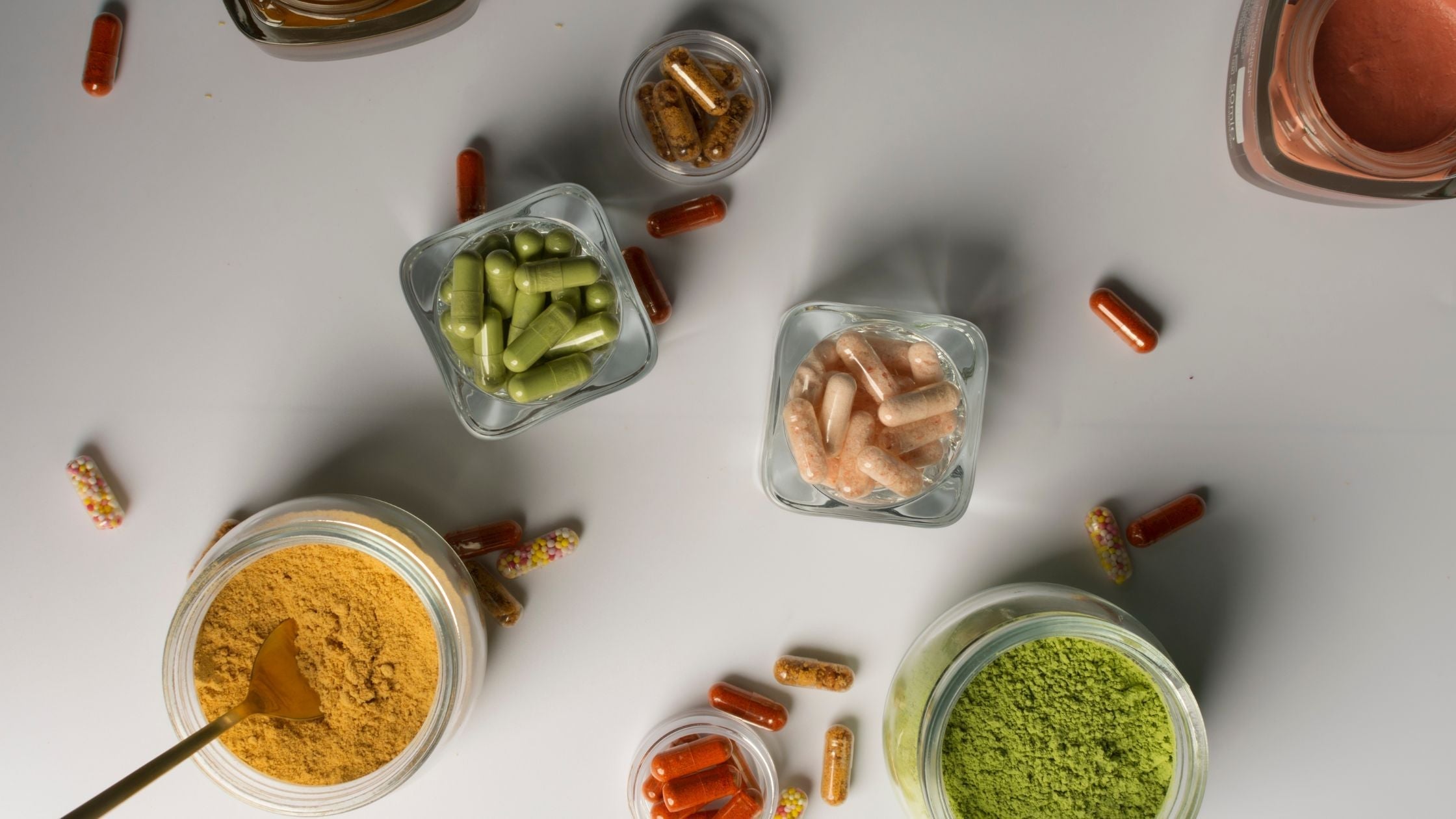A comprehensive resource for women navigating the menopause transition with evidence-based strategies for managing symptoms and maintaining vitality.
Introduction: Demystifying Menopause
Menopause represents a significant transition in a woman's life—one that approximately 1.3 million women in the United States begin experiencing each year [1]. Despite affecting half the population, menopause remains surprisingly misunderstood, often leaving women unprepared for the changes ahead.
This guide aims to provide clarity, cutting through misconceptions with evidence-based information to help you navigate this transition with confidence. Whether you're just beginning to notice subtle shifts or are already experiencing significant changes, understanding the science behind your symptoms is the first step toward effective management.
What Is Menopause? Understanding the Basics
Menopause is officially defined as the point when you've gone 12 consecutive months without a menstrual period due to the natural decline of reproductive hormones. However, the transition to menopause—often called perimenopause—typically begins several years earlier and can last 7-10 years for many women.
The Three Stages of Menopause
-
Perimenopause: The transitional years before menopause when hormone levels begin fluctuating significantly. This stage typically begins in your 40s but can start in your 30s.
-
Menopause: The point marking 12 consecutive months without a menstrual period, signifying the end of reproductive capability. The average age is 51 in the United States, with most women experiencing menopause between ages 45 and 56 [1].
-
Postmenopause: All the years beyond menopause, when symptoms may improve for many women but when preventative health becomes increasingly important.
Timing Variations
While the average age of menopause is 51, approximately 5% of women experience early natural menopause between ages 40-45, and about 1% experience primary ovarian insufficiency with cessation of menses before age 40 [1].
Research also indicates demographic differences, with Black and Hispanic women having slightly higher rates of premature and early menopause (1.4%) compared to white women (1%) [1].
The Science Behind Your Symptoms: What's Actually Happening
At its core, menopause is driven by changing levels of estrogen, progesterone, and other hormones. These fluctuations affect virtually every system in your body—from your brain to your skin.
Key Hormonal Changes
-
Declining estrogen: Affects bone density, skin elasticity, temperature regulation, and cognitive function
-
Fluctuating progesterone: Impacts sleep quality, mood stability, and energy levels
-
Changing testosterone levels: Influences energy, libido, and muscle mass
These hormonal shifts create a cascade of effects throughout your body, explaining the wide range of symptoms that can occur during this transition.
Key Hormones in Menopause: Understanding Your Body's Chemical Messengers
Hormones act as your body's chemical messengers, regulating everything from metabolism to mood. During menopause, several crucial hormones undergo significant changes, creating the cascade of symptoms many women experience. Understanding these hormones and their functions helps explain why menopause affects so many different aspects of your health and wellbeing.
Estrogen: The Primary Female Hormone
What it is: Estrogen is not a single hormone but a group of related hormones, with estradiol being the most abundant form during reproductive years.
Primary functions:
-
Regulates menstrual cycle and reproductive function
-
Maintains bone density by inhibiting bone breakdown
-
Supports cardiovascular health by maintaining blood vessel flexibility
-
Influences cognitive function and mood regulation
-
Maintains skin elasticity and collagen production
-
Helps regulate body temperature
-
Supports vaginal and urinary tract health
During menopause: Estrogen levels decline substantially, often fluctuating dramatically during perimenopause before reaching consistently lower levels. This decline is responsible for many of the most common menopause symptoms, including hot flashes, night sweats, vaginal dryness, and accelerated bone loss.
Progesterone: The Balancing Hormone
What it is: Progesterone is primarily produced by the corpus luteum in the ovaries after ovulation and by the placenta during pregnancy.
Primary functions:
-
Prepares the uterine lining for potential pregnancy
-
Helps regulate sleep patterns and has a calming effect on the brain
-
Balances the effects of estrogen on the uterine lining
-
Supports thyroid function
-
Influences fluid balance and may affect bloating
During menopause: Progesterone levels fall dramatically as ovulation becomes irregular and eventually stops. This decline contributes to sleep disturbances, mood changes, and irregular menstrual patterns during perimenopause.
Testosterone: Not Just a Male Hormone
What it is: Though often thought of as a male hormone, testosterone plays important roles in women's health as well. In women, it's produced in smaller amounts by the ovaries and adrenal glands.
Primary functions:
-
Maintains muscle mass and strength
-
Contributes to bone density
-
Supports cognitive function
-
Influences energy levels
-
Plays a significant role in sexual desire and arousal
-
Contributes to overall sense of wellbeing and motivation
During menopause: Testosterone levels typically decrease gradually with age, though this decline begins before menopause and continues afterward. Some women experience a sharper drop during the menopausal transition, which may contribute to decreased energy, reduced sexual desire, and changes in body composition.
Follicle-Stimulating Hormone (FSH) and Luteinizing Hormone (LH)
What they are: FSH and LH are produced by the pituitary gland and regulate the production of estrogen and progesterone.
Primary functions:
-
FSH stimulates the growth of ovarian follicles and the production of estrogen
-
LH triggers ovulation and stimulates the production of progesterone
During menopause: As ovarian function declines, the body tries to stimulate estrogen production by increasing FSH levels. High FSH levels are often used as a clinical marker of menopause, though they can fluctuate significantly during perimenopause.
Cortisol: The Stress Hormone
What it is: While not a reproductive hormone, cortisol (produced by the adrenal glands) is worth mentioning because stress and menopause often interact.
Primary functions:
-
Helps regulate metabolism and immune response
-
Plays a key role in stress response
-
Affects blood sugar levels and energy regulation
-
Influences sleep-wake cycles
During menopause: Hormonal fluctuations can increase stress sensitivity, potentially leading to elevated cortisol levels. Additionally, sleep disruptions common during menopause can affect cortisol patterns, creating a cycle that may worsen symptoms like fatigue, weight changes, and mood fluctuations.
DHEA (Dehydroepiandrosterone)
What it is: DHEA is produced by the adrenal glands and serves as a precursor to both estrogen and testosterone.
Primary functions:
-
Acts as a building block for sex hormones
-
Supports immune function
-
Contributes to energy levels and sense of wellbeing
-
May play a role in maintaining cognitive function
During menopause: DHEA levels decline with age, contributing to the overall reduction in sex hormone levels. This decrease may affect energy, mood, and sexual function.
Understanding these hormonal changes provides context for the wide range of symptoms experienced during menopause. Rather than isolated issues, these symptoms reflect your body's comprehensive response to changing hormone levels across multiple systems. This knowledge forms the foundation for effective symptom management strategies tailored to your specific hormonal profile.
Common Menopause Symptoms: What to Expect
Research indicates that up to 80% of women experience noticeable symptoms during perimenopause and menopause [2]. These symptoms vary significantly in both type and intensity, with some women experiencing minimal disruption while others face more significant challenges.
Physical Symptoms
-
Hot flashes and night sweats: Experienced by approximately 75% of women, these sudden feelings of warmth—known as vasomotor symptoms (VMS)—can disrupt daily activities and sleep [2].
-
Sleep disturbances: Beyond night sweats, hormonal changes directly impact sleep architecture, making it harder to fall asleep and stay asleep [3].
-
Changes in energy levels: Fluctuating hormones affect cellular energy production, leading to unexpected fatigue or energy crashes [4].
-
Joint and muscle discomfort: Declining estrogen can increase inflammation and reduce collagen production, contributing to joint stiffness [5].
Skin and Hair Changes
-
Skin thinning and dryness: Declining estrogen leads to decreased collagen production (up to 30% loss in the first five years of menopause), resulting in thinner, drier, and less elastic skin [23].
-
Accelerated aging signs: Reduced estrogen can lead to more pronounced wrinkles, sagging, and slower wound healing due to diminished skin cell renewal [24].
-
Hair thinning and texture changes: Many women notice hair becoming thinner, drier, and more brittle, with up to 40% experiencing female pattern hair loss following menopause [25].
-
Facial hair changes: Some women develop unwanted facial hair, particularly on the chin and upper lip, due to the changing ratio of estrogen to testosterone [26].
-
Skin sensitivity and itching: Hormonal fluctuations can increase skin reactivity and pruritus (itching), making skin more sensitive to products that were previously well-tolerated [27].
Cognitive and Emotional Changes
-
Brain fog: Many women report difficulty concentrating, minor memory lapses, or trouble finding the right words.
-
Mood fluctuations: Hormonal shifts can trigger mood changes, including increased irritability, anxiety, or periods of low mood.
-
Emotional sensitivity: Many women notice heightened emotional responses during this transition.
Longer-Term Health Considerations
-
Bone density changes: Estrogen plays a crucial role in maintaining bone mineral density, making bone health a priority during and after menopause.
-
Cardiovascular effects: The protective effects of estrogen on heart health diminish after menopause, making heart health increasingly important.
-
Metabolic shifts: Changes in how your body processes and stores energy can affect weight distribution and management.
When to Seek Medical Support
While menopause is a natural transition, certain symptoms warrant professional attention:
-
Extremely heavy or irregular bleeding during perimenopause
-
Severe mood changes that interfere with daily functioning
-
Debilitating hot flashes or night sweats
-
Heart palpitations or chest pain
-
Any symptoms that significantly impact your quality of life
A healthcare provider specializing in women's health can help determine whether your symptoms require intervention and discuss appropriate options.
Supporting Your Body Through Menopause: Key Ingredients That Make a Difference
As your body navigates hormonal changes, certain evidence-based ingredients can provide targeted support for specific menopause symptoms. Here's how some of the most promising natural compounds work to address different aspects of the menopausal transition:
Black Cohosh: Temperature Regulation and Comfort
How it helps: Black cohosh has been shown in multiple clinical studies to help maintain comfortable body temperature and reduce the frequency of hot flashes [6]. A clinical trial published in Gynecological Endocrinology demonstrated significant improvement in quality of life measurements for women taking black cohosh [7].
The science: Research suggests black cohosh works by interacting with serotonin receptors, which play a role in temperature regulation [8]. At a dosage of 40-80mg daily, studies show black cohosh may help reduce hot flash frequency by 25-50% in many women [9].
Who benefits most: Women experiencing frequent hot flashes and night sweats, particularly those looking for non-hormonal support options.
Ashwagandha: Stress Resilience and Energy Balance
How it helps: This adaptogenic herb helps your body respond more effectively to stress while supporting energy levels and mood stability—key concerns during hormonal transitions [10].
The science: Ashwagandha has been shown to help reduce cortisol levels (the stress hormone) and support adrenal function [11], which becomes increasingly important as ovarian hormone production declines. Studies using 300mg daily show significant improvements in stress response and energy consistency [12].
Who benefits most: Women experiencing mood fluctuations, fatigue, or increased stress sensitivity during menopause.
Red Clover Extract: Hormonal Balance Support
How it helps: Rich in isoflavones (plant compounds with mild estrogen-like effects), red clover provides gentle support during hormonal fluctuations [13].
The science: Studies suggest red clover isoflavones may help reduce hot flash frequency and support cardiovascular health during the menopausal transition [14]. At 40-80mg daily, research shows modest but meaningful benefits for many women [15].
Who benefits most: Women seeking plant-based support for multiple menopause symptoms, particularly those concerned about heart health.
Vitamin K2: Bone Health Protection
How it helps: Vitamin K2 plays a crucial role in bone health by helping direct calcium to your bones where it's needed, rather than allowing it to accumulate in soft tissues [16].
The science: Research shows vitamin K2 (particularly in the MK-7 form) works synergistically with vitamin D and calcium to support bone mineral density [17]—especially important during and after menopause when bone loss accelerates. A daily intake of 90-120mcg has shown beneficial effects on bone health markers [18].
Who benefits most: All women concerned about maintaining bone strength during the menopausal transition and beyond.
Calcium Citrate: Bioavailable Bone Support
How it helps: Calcium is essential for maintaining bone density, which becomes even more critical as estrogen levels decline during menopause [19].
The science: The citrate form offers superior absorption compared to less expensive calcium carbonate [20], particularly important for women over 45 who may have naturally declining stomach acid levels. Research supports an intake of 500-1000mg daily for bone health maintenance [21].
Who benefits most: Women concerned about bone density, especially those with family histories of osteoporosis or osteopenia.
Magnesium Bisglycinate: Sleep Quality and Mood Support
How it helps: This highly absorbable form of magnesium supports sleep quality, muscle relaxation, and mood stability—all commonly affected during menopause [22].
The science: Magnesium plays a role in over 300 enzymatic reactions in the body, including those that regulate neurotransmitters involved in sleep and mood. The bisglycinate form is gentle on the digestive system while providing optimal absorption. Studies suggest 150-300mg daily can help support relaxation and sleep quality [28].
Who benefits most: Women experiencing sleep disturbances, muscle tension, or mood fluctuations during the menopausal transition.
Probiotics: Digestive and Vaginal Health Support
How it helps: Specific probiotic strains support both digestive comfort and vaginal health, which can be affected by changing estrogen levels [29].
The science: Research shows that Lactobacillus acidophilus, Bifidobacterium bifidum, and Bacillus subtilis help maintain healthy bacterial balance in both the digestive tract and vaginal tissues [30]. During menopause, this support becomes especially valuable as hormonal changes can disrupt natural microbiome balance [31].
Who benefits most: Women experiencing digestive changes or vaginal discomfort related to hormonal shifts.
The Importance of Quality and Formulation
While individual ingredients offer specific benefits, research indicates a comprehensive approach typically yields the best results for menopause symptom management. The ideal supplement formulation provides:
-
Research-backed dosages: Ingredients in the same amounts shown effective in clinical studies
-
Bioavailable forms: Enhanced absorption for maximum benefit
-
Complementary ingredients: Compounds that work synergistically rather than in isolation
-
Quality testing: Third-party verification of purity and potency
When evaluating menopause supplements, look beyond marketing claims to the actual ingredient forms, dosages, and manufacturing standards. A truly premium formulation combines scientific rigor with transparency, giving your body optimal support during this significant transition.
In future articles, we'll explore each of these key ingredients in greater depth, including the latest research, optimal dosing considerations, and how they work together to support overall wellbeing during menopause.
Evidence-Based Management Strategies
Research demonstrates that a multi-faceted approach typically yields the best results for managing menopause symptoms. Here are science-backed strategies to consider:
Lifestyle Approaches
1. Strategic Exercise
Research shows that consistent physical activity can reduce the frequency of hot flashes by up to 60% while improving sleep quality, mood, and bone health [32].
-
Strength training: 2-3 sessions weekly helps maintain muscle mass and bone density [33]
-
Cardiovascular exercise: 150 minutes weekly improves heart health and mood [34]
-
Mind-body exercises: Yoga and tai chi have been shown to reduce stress and improve sleep quality [34]
2. Nutritional Support
While no single diet works for everyone, research indicates certain nutritional approaches can help manage symptoms:
-
Mediterranean-style eating patterns: Associated with fewer hot flashes and better overall health outcomes [35]
-
Phytoestrogen-containing foods: Soy, flaxseed, and other plant compounds may help balance hormonal fluctuations [36]
-
Anti-inflammatory focus: Emphasizing fruits, vegetables, healthy fats, and lean proteins helps combat increased inflammation [37]
3. Sleep Optimization
Quality sleep becomes particularly important—and often more challenging—during menopause:
-
Consistent sleep schedule: Maintaining regular sleep-wake times supports your circadian rhythm
-
Optimal sleep environment: A cool (65-68°F), dark, quiet bedroom helps counteract temperature fluctuations
-
Relaxation practices: Pre-sleep meditation or gentle stretching can improve sleep onset
Supplement Considerations
While research on supplements varies in quality and conclusions, several show promising results for menopause symptom management:
1. Evidence-Based Botanical Supports
-
Black cohosh: Multiple clinical studies show potential benefits for hot flashes and night sweats
-
Ashwagandha: Research indicates this adaptogen may help manage stress and support energy levels
-
Red clover: Some studies suggest modest benefits for hot flashes and bone health
2. Essential Nutrients
-
Calcium and vitamin D: Crucial for maintaining bone density during and after menopause
-
Magnesium: Supports sleep quality, mood regulation, and bone health
-
B vitamins: Help support energy production and cognitive function during hormonal transitions
When considering supplements, quality matters significantly. Look for products that:
-
Use evidence-based ingredients in research-supported dosages
-
Provide transparency about testing and manufacturing
-
Avoid proprietary blends that mask individual ingredient amounts
-
Use bioavailable forms of nutrients for optimal absorption
Medical Approaches
For many women, medical interventions provide significant relief from disruptive symptoms:
1. Hormone Replacement Therapy (HRT)
The most effective treatment for many menopause symptoms, particularly hot flashes and night sweats [38]. Current guidelines suggest:
-
Lower doses for shorter durations show the most favorable risk-benefit profile
-
Starting within 10 years of menopause may offer the most benefits with fewer risks
-
Personalized approaches based on individual health history yield the best outcomes
2. Non-Hormonal Medications
For women who cannot or prefer not to use HRT, several alternatives exist:
-
Low-dose antidepressants (SSRIs/SNRIs) can reduce hot flash frequency
-
Gabapentin or similar medications may help with sleep and temperature regulation
-
Clonidine may be helpful for some women experiencing hot flashes
These options should be discussed with a healthcare provider who can help weigh potential benefits against possible side effects.
Creating Your Personalized Menopause Strategy
Every woman's menopause experience is unique, influenced by genetics, lifestyle, stress levels, and individual health factors. Creating a personalized approach involves:
1. Tracking Your Symptoms
Understanding your specific pattern of symptoms helps you identify triggers and effective solutions:
-
Note symptoms, intensity, timing, and potential triggers
-
Track lifestyle factors like sleep, stress, exercise, and nutrition
-
Identify patterns to develop targeted strategies
2. Building Your Support Team
Research shows women with strong support networks navigate menopause more successfully:
-
Healthcare providers who specialize in menopause
-
Mental health professionals if needed
-
Community of women sharing similar experiences
-
Supportive family members and friends
3. Developing Lifestyle Routines That Work With Your New Normal
-
Morning routines that set a foundation for energy
-
Stress management practices throughout the day
-
Evening routines that support quality sleep
-
Weekly exercise patterns that maintain strength and cardiovascular health
The Future of Menopause Care: Emerging Research and Innovations
The field of menopause research is advancing rapidly, with several promising developments:
-
New non-hormonal medications specifically targeting hot flashes
-
Advanced hormone therapies with potentially improved safety profiles
-
Better understanding of the impact of menopause on brain health
-
Increasing recognition of menopause as a critical window for preventative health interventions
Staying informed about these developments can help you advocate for the best care as new options become available.
Embracing the Transition: Finding Strength and Growth
While menopause presents genuine challenges, many women also describe this time as one of personal growth, increased self-awareness, and reclaimed energy for new pursuits [39].
Research indicates that women who view menopause as a natural transition rather than a medical problem generally report more positive experiences [40]. This perspective shift doesn't diminish real symptoms but can enhance resilience and emotional wellbeing throughout the journey.
Conclusion: Your Menopause Journey
Menopause represents a significant transition, but with evidence-based information and appropriate support, it can also be a time of empowerment and renewed focus on health and wellbeing.
By understanding the biological foundations of your symptoms, exploring the range of management options available, and creating personalized strategies, you can navigate this transition with confidence and maintain your vitality throughout this new chapter.
Remember that your experience is unique, and the strategies that work best will be those tailored to your specific symptoms, preferences, and health needs. With the right information and support, you can thrive during this significant life transition.
Medical Disclaimer: The information provided in this article is for educational purposes only and is not intended to be a substitute for professional medical advice, diagnosis, or treatment. Always seek the advice of your physician or other qualified health provider with any questions you may have regarding a medical condition.
References
-
Peacock K, Ketvertis KM, Carlson K. Menopause. [Updated 2023 Dec 21]. In: StatPearls [Internet]. Treasure Island (FL): StatPearls Publishing; 2025 Jan-. Available from: https://www.ncbi.nlm.nih.gov/books/NBK507826/
-
Thurston RC, Joffe H. Vasomotor symptoms and menopause: findings from the Study of Women's Health across the Nation. Obstet Gynecol Clin North Am. 2011 Sep;38(3):489-501. doi: 10.1016/j.ogc.2011.05.006. PMID: 21961716; PMCID: PMC3185243.
-
Baker FC, Lampio L, Saaresranta T, Polo-Kantola P. Sleep and Sleep Disorders in the Menopausal Transition. Sleep Med Clin. 2018 Sep;13(3):443-456. doi: 10.1016/j.jsmc.2018.04.011. PMID: 30098758; PMCID: PMC6092036.
-
Filippi M, Krähenmann R, Fissler P. The Link Between Energy-Related Sensations and Metabolism: Implications for Treating Fatigue. Front Psychol. 2022 Jun 21;13:920556. doi: 10.3389/fpsyg.2022.920556. PMID: 35800955; PMCID: PMC9255916.
-
Roman-Blas JA, Castañeda S, Largo R, Herrero-Beaumont G. Osteoarthritis associated with estrogen deficiency. Arthritis Res Ther. 2009;11(5):241. doi: 10.1186/ar2791. Epub 2009 Sep 21. PMID: 19804619; PMCID: PMC2787275.
-
Shahnazi M, Nahaee J, Mohammad-Alizadeh-Charandabi S, Bayatipayan S. Effect of black cohosh (cimicifuga racemosa) on vasomotor symptoms in postmenopausal women: a randomized clinical trial. J Caring Sci. 2013 Jun 1;2(2):105-13. doi: 10.5681/jcs.2013.013. PMID: 25276716; PMCID: PMC4161092.
-
Mollá, Maria & García-Sánchez, Yolanda & Sarri, Alberto & Perez-Lopez, Faustino. (2009). Cimicifuga racemosa treatment and health related quality of life in post-menopausal Spanish women. Gynecological endocrinology : the official journal of the International Society of Gynecological Endocrinology. 25. 21-6. 10.1080/09513590802404005.
-
Ruhlen RL, Sun GY, Sauter ER. Black Cohosh: Insights into its Mechanism(s) of Action. Integr Med Insights. 2008;3:21-32. Epub 2008 Aug 27. PMID: 21614156; PMCID: PMC3046019.
-
Mohapatra S, Iqubal A, Ansari MJ, Jan B, Zahiruddin S, Mirza MA, Ahmad S, Iqbal Z. Benefits of Black Cohosh (Cimicifuga racemosa) for Women Health: An Up-Close and In-Depth Review. Pharmaceuticals (Basel). 2022 Feb 23;15(3):278. doi: 10.3390/ph15030278. PMID: 35337076; PMCID: PMC8953734.
-
Mikulska P, Malinowska M, Ignacyk M, Szustowski P, Nowak J, Pesta K, Szeląg M, Szklanny D, Judasz E, Kaczmarek G, Ejiohuo OP, Paczkowska-Walendowska M, Gościniak A, Cielecka-Piontek J. Ashwagandha (Withania somnifera)-Current Research on the Health-Promoting Activities: A Narrative Review. Pharmaceutics. 2023 Mar 24;15(4):1057. doi: 10.3390/pharmaceutics15041057. PMID: 37111543; PMCID: PMC10147008.
-
Wiciński M, Fajkiel-Madajczyk A, Kurant Z, Kurant D, Gryczka K, Falkowski M, Wiśniewska M, Słupski M, Ohla J, Zabrzyński J. Can Ashwagandha Benefit the Endocrine System?-A Review. Int J Mol Sci. 2023 Nov 20;24(22):16513. doi: 10.3390/ijms242216513. PMID: 38003702; PMCID: PMC10671406.
-
https://ods.od.nih.gov/factsheets/Ashwagandha-HealthProfessional/
-
Beck V, Rohr U, Jungbauer A. Phytoestrogens derived from red clover: an alternative to estrogen replacement therapy? J Steroid Biochem Mol Biol. 2005 Apr;94(5):499-518. doi: 10.1016/j.jsbmb.2004.12.038. Epub 2005 Mar 23. PMID: 15876415.
-
Kanadys W, Barańska A, Błaszczuk A, Polz-Dacewicz M, Drop B, Kanecki K, Malm M. Evaluation of Clinical Meaningfulness of Red Clover (Trifolium pratense L.) Extract to Relieve Hot Flushes and Menopausal Symptoms in Peri- and Post-Menopausal Women: A Systematic Review and Meta-Analysis of Randomized Controlled Trials. Nutrients. 2021 Apr 11;13(4):1258. doi: 10.3390/nu13041258. PMID: 33920485; PMCID: PMC8069620.
-
van de Weijer PH, Barentsen R. Isoflavones from red clover (Promensil) significantly reduce menopausal hot flush symptoms compared with placebo. Maturitas. 2002 Jul 25;42(3):187-93. doi: 10.1016/s0378-5122(02)00080-4. PMID: 12161042.
-
Maresz K. Proper Calcium Use: Vitamin K2 as a Promoter of Bone and Cardiovascular Health. Integr Med (Encinitas). 2015 Feb;14(1):34-9. PMID: 26770129; PMCID: PMC4566462.
-
van Ballegooijen AJ, Pilz S, Tomaschitz A, Grübler MR, Verheyen N. The Synergistic Interplay between Vitamins D and K for Bone and Cardiovascular Health: A Narrative Review. Int J Endocrinol. 2017;2017:7454376. doi: 10.1155/2017/7454376. Epub 2017 Sep 12. PMID: 29138634; PMCID: PMC5613455.
-
Schwalfenberg GK. Vitamins K1 and K2: The Emerging Group of Vitamins Required for Human Health. J Nutr Metab. 2017;2017:6254836. doi: 10.1155/2017/6254836. Epub 2017 Jun 18. PMID: 28698808; PMCID: PMC5494092.
-
Ruml LA, Sakhaee K, Peterson R, Adams-Huet B, Pak CY. The effect of calcium citrate on bone density in the early and mid-postmenopausal period: a randomized placebo-controlled study. Am J Ther. 1999 Nov;6(6):303-11. doi: 10.1097/00045391-199911000-00004. PMID: 11329114.
-
Harvey JA, Kenny P, Poindexter J, Pak CY. Superior calcium absorption from calcium citrate than calcium carbonate using external forearm counting. J Am Coll Nutr. 1990 Dec;9(6):583-7. doi: 10.1080/07315724.1990.10720413. PMID: 2273192.
-
Bolton-Smith C, McMurdo ME, Paterson CR, Mole PA, Harvey JM, Fenton ST, Prynne CJ, Mishra GD, Shearer MJ. Two-year randomized controlled trial of vitamin K1 (phylloquinone) and vitamin D3 plus calcium on the bone health of older women. J Bone Miner Res. 2007 Apr;22(4):509-19. doi: 10.1359/jbmr.070116. PMID: 17243866.
-
Zhang Y, Chen C, Lu L, Knutson KL, Carnethon MR, Fly AD, Luo J, Haas DM, Shikany JM, Kahe K. Association of magnesium intake with sleep duration and sleep quality: findings from the CARDIA study. Sleep. 2022 Apr 11;45(4):zsab276. doi: 10.1093/sleep/zsab276. PMID: 34883514; PMCID: PMC8996025.
-
Thornton MJ. Estrogens and aging skin. Dermatoendocrinol. 2013 Apr 1;5(2):264-70. doi: 10.4161/derm.23872. PMID: 24194966; PMCID: PMC3772914.
-
Stevenson S, Thornton J. Effect of estrogens on skin aging and the potential role of SERMs. Clin Interv Aging. 2007;2(3):283-97. doi: 10.2147/cia.s798. PMID: 18044179; PMCID: PMC2685269.
-
Rinaldi F, Trink A, Mondadori G, Giuliani G, Pinto D. The Menopausal Transition: Is the Hair Follicle "Going through Menopause"? Biomedicines. 2023 Nov 14;11(11):3041. doi: 10.3390/biomedicines11113041. PMID: 38002043; PMCID: PMC10669803.
-
Sachdeva S. Hirsutism: evaluation and treatment. Indian J Dermatol. 2010;55(1):3-7. doi: 10.4103/0019-5154.60342. PMID: 20418968; PMCID: PMC2856356.
-
Falcone D, Richters RJ, Uzunbajakava NE, Van Erp PE, Van De Kerkhof PC. Sensitive skin and the influence of female hormone fluctuations: results from a cross-sectional digital survey in the Dutch population. Eur J Dermatol. 2017 Feb 1;27(1):42-48. doi: 10.1684/ejd.2016.2913. PMID: 27873738.
-
Schwalfenberg GK, Genuis SJ. The Importance of Magnesium in Clinical Healthcare. Scientifica (Cairo). 2017;2017:4179326. doi: 10.1155/2017/4179326. Epub 2017 Sep 28. PMID: 29093983; PMCID: PMC5637834.
-
Mei Z, Li D. The role of probiotics in vaginal health. Front Cell Infect Microbiol. 2022 Jul 28;12:963868. doi: 10.3389/fcimb.2022.963868. PMID: 35967876; PMCID: PMC9366906.
-
Chee, W.J.Y., Chew, S.Y. & Than, L.T.L. Vaginal microbiota and the potential of Lactobacillus derivatives in maintaining vaginal health. Microb Cell Fact 19, 203 (2020). https://doi.org/10.1186/s12934-020-01464-4
-
Sternfeld B, Dugan S. Physical activity and health during the menopausal transition. Obstet Gynecol Clin North Am. 2011 Sep;38(3):537-66. doi: 10.1016/j.ogc.2011.05.008. PMID: 21961719; PMCID: PMC3270074.
-
Benedetti MG, Furlini G, Zati A, Letizia Mauro G. The Effectiveness of Physical Exercise on Bone Density in Osteoporotic Patients. Biomed Res Int. 2018 Dec 23;2018:4840531. doi: 10.1155/2018/4840531. PMID: 30671455; PMCID: PMC6323511.
-
Lin YY, Lee SD. Cardiovascular Benefits of Exercise Training in Postmenopausal Hypertension. Int J Mol Sci. 2018 Aug 25;19(9):2523. doi: 10.3390/ijms19092523. PMID: 30149647; PMCID: PMC6163560.
-
Xu H, Liu J, Li P, Liang Y. Effects of mind-body exercise on perimenopausal and postmenopausal women: a systematic review and meta-analysis. Menopause. 2024 May 1;31(5):457-467. doi: 10.1097/GME.0000000000002336. PMID: 38669625; PMCID: PMC11465887.
-
Vetrani C, Barrea L, Rispoli R, Verde L, De Alteriis G, Docimo A, Auriemma RS, Colao A, Savastano S, Muscogiuri G. Mediterranean Diet: What Are the Consequences for Menopause? Front Endocrinol (Lausanne). 2022 Apr 25;13:886824. doi: 10.3389/fendo.2022.886824. PMID: 35546996; PMCID: PMC9084275.
-
Domínguez-López I, Yago-Aragón M, Salas-Huetos A, Tresserra-Rimbau A, Hurtado-Barroso S. Effects of Dietary Phytoestrogens on Hormones throughout a Human Lifespan: A Review. Nutrients. 2020 Aug 15;12(8):2456. doi: 10.3390/nu12082456. PMID: 32824177; PMCID: PMC7468963.
-
Silva TR, Oppermann K, Reis FM, Spritzer PM. Nutrition in Menopausal Women: A Narrative Review. Nutrients. 2021 Jun 23;13(7):2149. doi: 10.3390/nu13072149. PMID: 34201460; PMCID: PMC8308420.
-
Harper-Harrison G, Carlson K, Shanahan MM. Hormone Replacement Therapy. [Updated 2024 Oct 6]. In: StatPearls [Internet]. Treasure Island (FL): StatPearls Publishing; 2025 Jan-. Available from: https://www.ncbi.nlm.nih.gov/books/NBK493191/
-
Yazdkhasti M, Simbar M, Abdi F. Empowerment and coping strategies in menopause women: a review. Iran Red Crescent Med J. 2015 Mar 20;17(3):e18944. doi: 10.5812/ircmj.18944. PMID: 26019897; PMCID: PMC4441783.
-
Tariq B, Phillips S, Biswakarma R, Talaulikar V, Harper JC. Women's knowledge and attitudes to the menopause: a comparison of women over 40 who were in the perimenopause, post menopause and those not in the peri or post menopause. BMC Womens Health. 2023 Aug 30;23(1):460. doi: 10.1186/s12905-023-02424-x. PMID: 37648988; PMCID: PMC10469514.





Share: